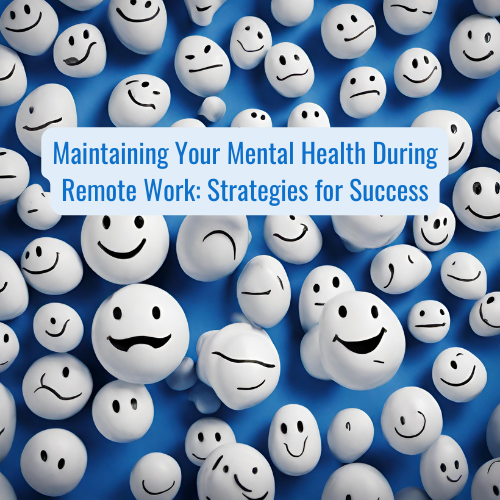Remote work has become a prevalent mode of employment, offering flexibility and convenience. However, it’s not without its challenges, particularly in terms of maintaining mental health. The absence of a traditional office environment and the blending of work and personal life can impact your well-being. In this blog, we’ll explore strategies to help you take care of your mental health while working remotely.
1. Establish a Routine
One of the first steps to safeguard your mental health during remote work is to establish a daily routine. Consistency provides structure and helps you separate work from personal life. Set regular working hours, allocate breaks, and maintain a routine that suits your productivity and well-being.
2. Create a Dedicated Workspace
Designate a workspace within your home that is solely for work. This helps mentally separate your job from your personal life. Ensure it’s comfortable, ergonomically friendly, and free from distractions to boost productivity and reduce stress.
3. Set Boundaries
Clearly define your work hours and communicate them to your family or housemates. Ensure they understand when you are unavailable to minimize interruptions and distractions during work hours.
4. Take Regular Breaks
Don’t forget to take short breaks throughout the day. Use this time to stretch, move around, and refresh your mind. Short breaks can improve concentration and reduce stress.
5. Socialize and Network
Remote work can sometimes lead to isolation. Make an effort to stay connected with colleagues and friends. Regular video calls, virtual coffee breaks, or even in-person meetups can help combat loneliness and build a sense of community.
6. Stay Active
Regular physical activity is crucial for your mental health. Incorporate exercise into your daily routine, whether it’s yoga, a home workout, or a walk outdoors. Exercise releases endorphins, which boost mood and reduce stress.
7. Practice Mindfulness and Stress Management
Take time to practice mindfulness and stress reduction techniques. Meditation, deep breathing exercises, and mindfulness apps can help you manage stress and stay centered.
8. Prioritize Self-Care
Don’t neglect self-care. Make time for activities you enjoy, whether it’s reading, hobbies, or simply unwinding. Prioritizing self-care helps you recharge and maintain a healthy work-life balance.
9. Set Achievable Goals
Set realistic goals for each day. Prioritize tasks, break them into manageable steps, and celebrate your achievements. This can help you stay motivated and prevent feelings of being overwhelmed.
10. Seek Professional Help
If you find yourself struggling with mental health issues while working remotely, don’t hesitate to seek professional help. Teletherapy or online counseling services are readily available and can provide the support you need.
Conclusion
Maintaining your mental health while working remotely is a continuous effort. By implementing these strategies, you can create a work environment that promotes well-being, productivity, and balance. Remember, it’s essential to recognize the signs of stress and burnout and take proactive steps to protect your mental health. Your well-being should always be a top priority, whether you’re working in an office or from the comfort of your home.







